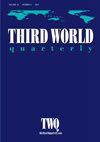‘Made in Kyrgyzstan is gold!’ the rise of the informal Kyrgyzstani apparel industry
IF 1.8
2区 经济学
Q2 DEVELOPMENT STUDIES
引用次数: 0
Abstract
The Kyrgyzstani apparel industry has seen spectacular growth in recent years, despite informal structures, a predatory business environment, and intersecting crises. Contrary to other apparel producers in the Global South, ‘Made in Kyrgyzstan’ (MiK) has emerged from below and independently of multinational corporations or state-funded development initiatives. This article takes an ethnographic approach to examine how apparel producers navigate the challenging national and geopolitical environment in which their businesses are embedded. It does so based on long-term fieldwork, conducted before (2019), during (2020, online), and after (2021) the pandemic at the Dordoi Bazaar in Bishkek, the main distribution platform for locally produced apparel. Based on the ethnographic material, this article questions the meaningfulness of an informality framework in the corrupt context of the Kyrgyzstani state, and instead shifts the focus on attempts to build durable businesses that are capable of dealing with local and global constraints. Doing so, it makes two related points. Firstly, it traces the unique nature of post-Soviet economic transformation in Kyrgyzstan through the peculiar growth of the informal apparel industry. Secondly, it emphasises the relevance of endemic state corruption when studying informal economic practices on the ground.“吉尔吉斯斯坦制造是黄金!”非正规的吉尔吉斯斯坦服装业的崛起
近年来,尽管结构不规范,商业环境掠夺性强,危机交织,但吉尔吉斯斯坦的服装业仍取得了惊人的增长。与全球南方的其他服装生产商不同,“吉尔吉斯斯坦制造”(MiK)是白手起家的,独立于跨国公司或国家资助的发展计划。本文采用人种学的方法来研究服装生产商如何在其业务所处的具有挑战性的国家和地缘政治环境中导航。这是根据疫情前(2019年)、期间(2020年)和之后(2021年)在比什凯克多尔多伊集市(当地生产服装的主要分销平台)进行的长期实地调查得出的结论。基于民族志材料,本文质疑在吉尔吉斯斯坦国家腐败的背景下非正式框架的意义,并将重点转移到建立能够应对当地和全球约束的持久企业的尝试上。这样做,它提出了两个相关的观点。首先,通过非正规服装产业的特殊增长,追溯了吉尔吉斯斯坦后苏联经济转型的独特性。其次,在实地研究非正式经济行为时,它强调了地方性国家腐败的相关性。
本文章由计算机程序翻译,如有差异,请以英文原文为准。
求助全文
约1分钟内获得全文
求助全文
来源期刊

Third World Quarterly
DEVELOPMENT STUDIES-
CiteScore
4.10
自引率
15.00%
发文量
137
期刊介绍:
Third World Quarterly ( TWQ ) is the leading journal of scholarship and policy in the field of international studies. For almost four decades it has set the agenda of the global debate on development discourses. As the most influential academic journal covering the emerging worlds, TWQ is at the forefront of analysis and commentary on fundamental issues of global concern. TWQ examines all the issues that affect the many Third Worlds and is not averse to publishing provocative and exploratory articles, especially if they have the merit of opening up emerging areas of research that have not been given sufficient attention. TWQ is a peer-reviewed journal that looks beyond strict "development studies", providing an alternative and over-arching reflective analysis of micro-economic and grassroot efforts of development practitioners and planners. It furnishes expert insight into crucial issues before they impinge upon global media attention. TWQ acts as an almanac linking the academic terrains of the various contemporary area studies - African, Asian, Latin American and Middle Eastern - in an interdisciplinary manner with the publication of informative, innovative and investigative articles. Contributions are rigorously assessed by regional experts.
 求助内容:
求助内容: 应助结果提醒方式:
应助结果提醒方式:


